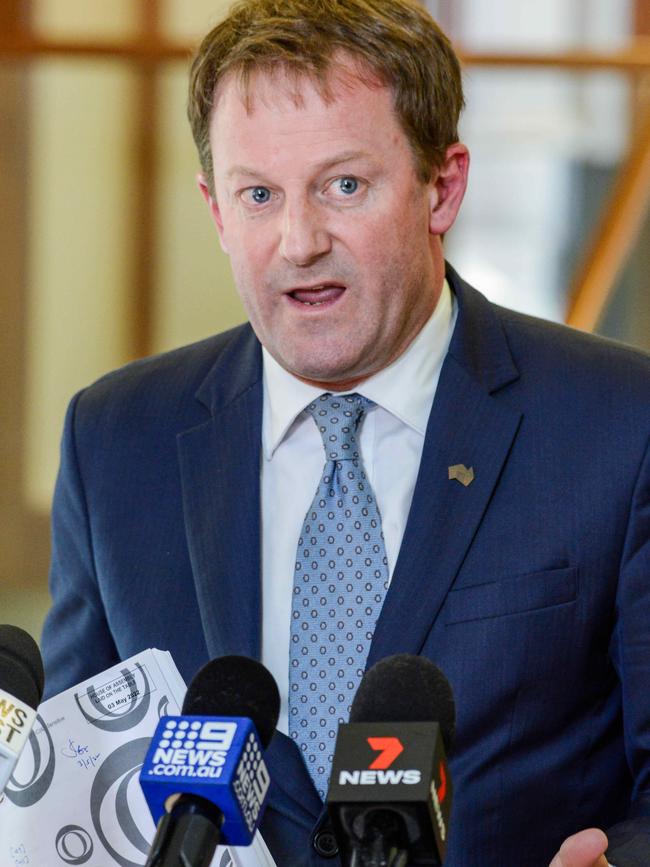Child Protection Department ‘uses lucky-dip system’ to choose which at-risk kids to check on
The Child Protection Department has no system in place to prioritise checks on at-risk kids – prompting a savage response from the SA Liberals.
SA News
Don't miss out on the headlines from SA News. Followed categories will be added to My News.
There is no “systematic way” of deciding which reports about at-risk children should be investigated or closed, the state government has been warned, prompting criticism vulnerable kids are “relying on a lucky-dip system” to keep them safe.
In the wake of revelations about the death of an 11-week-old boy whose family was the subject of 23 reports to authorities, The Advertiser can confirm the Child Protection Department is continuing to close a third of cases where it suspects a child is at risk – without further investigation.
The persistent practice was meant to be stopped last year but the department has suggested it is not realistic in the face of skyrocketing reports.
It follows a warning from former police commissioner Mal Hyde last month that “there isn’t any detailed, systematic way” of deciding which reports are investigated, referred elsewhere or closed as the process “can vary between offices … between supervisors as to where the priorities lie”.
Mr Hyde delivered the warning following his investigation into the involvement of government agencies with two unrelated children – Charlie Nowland and Makai Wanganeen – who died earlier this year.
Mr Hyde warned he could not “be assured that the most important cases are receiving attention” under the current system.
Opposition child protection spokesman Josh Teague has said the “unacceptable” situation is leaving vulnerable children “relying on a lucky-dip system”.
Mr Teague and the public sector union has urged Child Protection Minister Katrine Hildyard to fast-track planned changes that would raise an automatic alert when multiple reports are made about the same child or family.

Data provided to The Advertiser shows the department fielded 80,175 notifications about children potentially being abused or neglected in 2020-21 – the most recent figures available.
Of those, department workers “screened-in” 38,473 reports as requiring further action.
However, only 7277 investigations or assessments were done (19 per cent).
Another 17,638 cases (46 per cent) were referred to other services, such as non-government agencies, or “dealt with by other means”.
And 13,513 cases (35 per cent) were closed without any further action.
The proportion of cases closed in this way has fallen from about 44 per cent but successive coronial inquests and ombudsman investigations have called for an end to the practice. The 2016 Nyland Royal Commission set a deadline of 2021.
However, department deputy chief executive Fiona Ward said the number of “screened-in” reports had soared more than 60 per cent since 2017-18 and “this additional pressure on the system was something that was not known at the time of the (2016) Nyland Royal Commission”.
She said almost 40,000 such reports were lodged in 2019-20 and 2020-21 and “a similar figure is anticipated for 2021-22, as more families deal with complex issues including domestic violence, substance misuse and mental illness”.
Ms Ward said “all urgent notifications” received a response within 24 hours.
Public Service Association general secretary Natasha Brown said screened-in reports “indicated that certain cases have been identified for closer scrutiny and the community would expect there to be some follow-through”.
Mr Hyde called for a review of how reports are allocated for “investigation, referral or not proceeding … to ensure higher risk of harm matters receive priority attention … and there is an accountable system”.
The proportion of cases sent off to other agencies has grown from about 38 per cent in previous years, while the department has consistently investigated just fewer than 20 per cent.
A government spokesperson said Mr Teague and his former cabinet colleagues “had four years to make the changes to SA’s child protection system he now claims are urgent”.
“They did not progress any improvements; instead, things went backwards,” the spokesperson said.
“The state government has invested $128.9m into child protection, including additional staffing amongst a range of other measures, and is preparing to strengthen legislation and make other improvements.”



